#jewish filmmaker
Explore tagged Tumblr posts
Text
Lisa Chodolenko
youtube
Director and screenwriter Lisa Chodolenko was born in 1964 in Los Angeles, California. Chodolenko's debut feature, High Art, won the Waldo Salt Screenwriting Award at the Sundance Film Festival. Her next feature, Laurel Canyon, premiered at Cannes Directors' Fortnight. Chodolenko is best known as director and writer of the 2010 film The Kids are All Right, which was nominated for multiple Oscars, including Best Picture. She later won an Emmy Award and a Director's Guild Award for her work on the miniseries Olive Kitteridge.
#film#women in film#directors#screenwriters#jewish#jewish women#lesbian#lesbian directors#lesbian film#lgbt#lgbt filmmakers#lgbt cinema#Youtube
5 notes
·
View notes
Text
Zone of Interest: one day I'll break the habit of casually inviting friends to see intense and esoteric Holocaust movies with me, but not today. Son of Saul was a blinkered onslaught; Zone of Interest is so restrained that glimpses are interpreted horrors until the second-to-last scene opens the curtains. Magnificent.
#Zone of Interest#this and Son of Saul stand alone in recent Holocaust filmmaking#two entirely different approaches and both stunning#a nice jewish tag
18 notes
·
View notes
Text
13 The Musical Movie Missing Essential “Offensive” Songs
Evan Goldman is becoming a man in the Big Apple, or so he thought. After his parents divorce, he is forced to have his Bar Mitzvah in Indiana.

Photo by Sudan Ouyang from Unsplash
Musical Conventions
13 is unique with no adults in the cast; it is easier to suspend disbelief for the immature choices driven by dating. 13 has a song,
Terminal Illness, which focuses on Archie, a character with muscular dystrophy. A progressive neuromuscular condition. Terminal Illness is about Evan using Archie's disability to secure R-rated movie tickets for a date.
Authentic Teenagers
Archie is hormone-crazed for Kendra, the most popular girl in school, and Brett, the most popular guy.
Evan purposefully tells Archie he can date Kendra if he uses the pity he receives from his muscular dystrophy to his advantage and gets Evan's mother to pay for the tickets to the Bloodmaster.
While Evan is more focused on his Bar Mitzvah than Archie, the song and Archie are self-aware of disability. Evan:
"Listen, I'm not making fun. Of your terminal Illness. But you hold the secret to getting my mom to say yes. No one says no to a boy with a terminal illness. Who could refuse when you shuffle your shoes and say please? Use all the tricks that you learned in your cradle. You don't need to lay it on thick with a ladle. 'Cause no one says no to a boy with a fatal disease!”
Self Awareness
Archie is a charismatic character and, earlier in the musical, has a number of Get Me What I Need; he tells Evan that having a date with Kendra is his dying wish. Terminal Illness is a musical number that shows Evan views a disability as an advantage he can use, partly because Archie also uses it that way.
Nuances in "Offensive" Songs
During the number of Terminal Illnesses, the question "who could complain?" refers to this plan. Evan responds, "Except for you because you're dying. In the next stanza, Archie responds, "Except for you because you're Jewish and you always complain." Evan says, "It's true." Both responses are played for laughs.
This song shows both boys are willing to use what they can to get a date. Throughout the musical, Archie makes jokes about his disability. It is played for laughs as self-deprecating humor. "No one makes fun of me on the special needs bus. That would be ironic.”
The movie adaptation omits all of these small details about Archie and songs such as Terminal Illness most likely to modernize the musical to be less offensive. However these songs drive the musical plot forward that has a more realistic depictions of a person's early teenage years.
References
Hessenger, J. (2022). 13: The Musical Follows Broadway Tradition by Becoming a Terrible Movie. Paste Magazine. https://www.pastemagazine.com/movies/13-the-musical-review
#movie adaptation#musical theatre#jewish#filmmaking#13 the musical#bar mitzvah#party#teenagers#authencity#sanitized art
4 notes
·
View notes
Text


Arturo Ripstein, {1974} El Santo Oficio (The Holy Inquisition)
#film#gif#arturo ripstein#el santo oficio#the holy inquisition#1974#people#feature length#colour#male filmmakers#1970s#mexico#jewish cinema
6 notes
·
View notes
Text
The recent additions to the Marvel Cinematic Universe has been steadily falling off anyhow thanks to Disney, so I wasn’t too surprised at this news.
However I’d like to also point out the absolute hypocrisy of this decision:
Sabra was an early character during the beginning eras of marvel, which unlike how black panther was made for the sole purpose of fighting back in a cause, Sabra was and additional character to diversify the many heroes from all over the globe. This component is the key part of Sabra. Taking that away on the mcu’s part not only opposes their modernized “representation motive” while also being antisemetic without making it seem as antisemitism.
As a film major I’m already super disappointed to the direction of modern releases and especially pissed off that Hollywood continues their double standards when it comes to Jewish representation within characters and the stories they inhabit. It’s everything inclusive except for Jews; they are simply not allowed to be in character spaces.
Stories are a part of what makes us human; removing one of many varieties of such defeats this purpose.
My point is, stories are for everyone, including for Jewish people!

So is making her RUSSIAN somehow less controversial than making her Israeli?? Really??
It is absolutely disgusting to erase a character's identity like this. I'm not a marvel fan, but as an Israel-born Jew I was looking forward to on-screen representation and would've loved to see Sabra on screen.
Definitely won't be watching now, what's even the point?
#I am SO drawing Sabra as an updated MCU character!!#she deserves it#This is why I love my major so much! It’s an art of expressing so many human experiences and concepts#jumblr#antisemitism#marvel#sabra marvel#superhero#superheroes#jewish#judaism#film rant#filmmaking#film major#marvel rant#shame on you marvel
753 notes
·
View notes
Text
guys, Israelism (2023), a documentary made by jewish filmmakers that focuses on the insane zionist brainwashing jewish US americans go through throughout their entire lives and how difficult it is to even open your eyes to it when you grow up in that type of cultist and fascist environment, is now available for free on youtube ! I urge you to watch it !
1K notes
·
View notes
Note
If we were real life friends I would go and watch Bottoms with you
I remember reading about it in an article of upcoming lgbtqia+ movies that are gong to be relesed in 2023-2024 and I got so excited!
Aww that's so kind of you anon! Like it would be really hard finding someone that's into that sort of movie irl so I do appreciate your offer lol 😜
It looks so good right?? Exactly the kind of fucked up humour I need in a movie lmao and also! The creator is so awesome, I've been following her career since shiva baby (a fantastic movie btw) and I'm really really excited to see what she's gonna bring us with this one!
Now all we gotta do is wait and hope for a close theater release lol
#inbox#anonymous#bottoms (movie)#who are you kind anon that offered such a great thing lol#i wish i could watch it with all of the queer ladies in my vicinity lol#also if you'll are excited for bottoms and haven't watched shiva baby then do it now!!#it's gay and it's wild and so very jewish lmao#the amount of second hand anxiety i got from it was so damn high lol#but it's such a great movie!!!!#i'm just so hyped to another movie from that filmmaker#emma seligman your mind is a place i wanna visit
0 notes
Text
We're Taking a Break to Continue Our Research on the Late, Great Australian Director of Photography & Cinematographer Robert Krasker, BSC

View On WordPress
#Bob Krasker#Bobby Krasker#Fujifilm Summit#great Jewish filmmakers#great Jewish moviemakers#NAB#Robert Krasker BSC#The Robert Krasker Project
0 notes
Text
The Forgotten History of the World’s First Transgender Clinic
I finished the first round of edits on my nonfiction history of trans rights today. It will publish with Norton in 2025, but I decided, because I feel so much of my community is here, to provide a bit of the introduction.
[begin sample]
The Institute for Sexual Sciences had offered safe haven to homosexuals and those we today consider transgender for nearly two decades. It had been built on scientific and humanitarian principles established at the end of the 19th century and which blossomed into the sexology of the early 20th. Founded by Magnus Hirschfeld, a Jewish homosexual, the Institute supported tolerance, feminism, diversity, and science. As a result, it became a chief target for Nazi destruction: “It is our pride,” they declared, to strike a blow against the Institute. As for Magnus Hirschfeld, Hitler would label him the “most dangerous Jew in Germany.”6 It was his face Hitler put on his antisemitic propaganda; his likeness that became a target; his bust committed to the flames on the Opernplatz. You have seen the images. You have watched the towering inferno that roared into the night. The burning of Hirschfeld’s library has been immortalized on film reels and in photographs, representative of the Nazi imperative, symbolic of all they would destroy. Yet few remember what they were burning—or why.
Magnus Hirschfeld had built his Institute on powerful ideas, yet in their infancy: that sex and gender characteristics existed upon a vast spectrum, that people could be born this way, and that, as with any other diversity of nature, these identities should be accepted. He would call them Intermediaries.
Intermediaries carried no stigma and no shame; these sexual and Gender nonconformists had a right to live, a right to thrive. They also had a right to joy. Science would lead the way, but this history unfolds as an interwar thriller—patients and physicians risking their lives to be seen and heard even as Hitler began his rise to power. Many weren’t famous; their lives haven’t been celebrated in fiction or film. Born into a late-nineteenth-century world steeped in the “deep anxieties of men about the shifting work, social roles, and power of men over women,” they came into her own just as sexual science entered the crosshairs of prejudice and hate. The Institute’s own community faced abuse, blackmail, and political machinations; they responded with secret publishing campaigns, leaflet drops, pro-homosexual propaganda, and alignments with rebel factions of Berlin’s literati. They also developed groundbreaking gender affirmation surgeries and the first hormone cocktail for supportive gender therapy.
Nothing like the Institute for Sexual Sciences had ever existed before it opened its doors—and despite a hundred years of progress, there has been nothing like it since. Retrieving this tale has been an exercise in pursuing history at its edges and fringes, in ephemera and letters, in medal texts, in translations. Understanding why it became such a target for hatred tells us everything about our present moment, about a world that has not made peace with difference, that still refuses the light of scientific evidence most especially as it concerns sexual and reproductive rights.
[end sample]
I wanted to add a note here: so many people have come together to make this possible. Like Ralf Dose of the Magnus-Hirschfeld-Gesellschaft (Magnus Hirschfeld Archive), Berlin, and Erin Reed, American journalist and transgender rights activist—Katie Sutton, Heike Bauer. I am also deeply indebted to historian, filmmaker and formative theorist Susan Stryker for her feedback, scholarship, and encouragement all along the way. And Laura Helmuth, editor of Scientific American, whose enthusiasm for a short article helped bring the book into being. So many LGBTQ+ historians, archivists, librarians, and activists made the work possible, that its publication testifies to the power of the queer community and its dedication to preserving and celebrating history. But I ALSO want to mention you, folks here on tumblr who have watched and encouraged and supported over the 18 months it took to write it (among other books and projects). @neil-gaiman has been especially wonderful, and @always-coffee too: thank you.
The support of this community has been important as I’ve faced backlash in other quarters. Thank you, all.
NOTE: they are attempting to rebuild the lost library, and you can help: https://magnus-hirschfeld.de/archivzentrum/archive-center/
#support trans rights#trans history#trans#transgender#trans woman#trans rights#trans representation#interwar period#weimar#equality#autistic author#nonbinary#lgbtq representation#lgbtqia#book news#book#books#new books#thank you#neil gaiman#for your support
2K notes
·
View notes
Text
this post about indiana jones annoys me so much bc the answer to why he fights nazis is so incredibly simple if your head isnt up your ass. hes jewish. hes a jewish character created by one of the most famous jewish filmmakers in history who made the most famous movie about the holocaust in history. he is literally played by a jewish actor. its not anachronistic for him to hate nazis
anyway watch this video about how raiders of the lost ark and the last crusade are structured around the punishment of nazis and their collaborators- including rich white american industrialists. steven spielberg made indiana jones hate nazis bc HE hates nazis
youtube
#hoodie talks#theres a lot to talk about re: speilberg and jewishness for several reasons but this is the most interesting imo#indiana jones#Youtube
376 notes
·
View notes
Text
these days film is such an established cultural fixture that virtually every artistic and political leaning interfaces with film in some way, but in the 1910s-30s film was new and niche enough that it was generally associated with a single group in each film industry, and it’s interesting to see how that plays into the skeletons in the closet of the film world.
in europe, the birthplace of the moving picture, film was an intensely innovative artistic technology, and as such it was largely associated with avant-garde artistic groups. in italy that artistic movement was futurism, which, innovation- and masculinity-obsessed as they were, infamously threw their lot in with the fascists as a movement, and italian film made the smooth transition to being almost exclusively fascist propaganda, with cabiria (1914) standing as the unfortunate but indisputable gem of early italian filmmaking. by contrast, in germany the primary avant-garde artistic movement was german expressionism, which attracted many jewish, queer, and mentally ill artists, as well as many who sympathized or were artistically interested in them. as such, early german film experienced a hard reset in the mid-30s, with the traditions of early greats like metropolis (1927) transplanting wholesale to america as a new, more italian-style tradition of greats like the triumph of the will (1935) muscled into the void.
on another hand, in america, birthplace of the movie, film arrived on the west coast not as a new technology but as an entertainment technology, and as such it interfaced smoothly with the existing entertainment infrastructure, both on the artists’ and the audience’s side. vaudeville-trained audiences looked for newer and bigger visual spectacles, which could only be provided by a corporatized film industry with lots of capital and a willingness to cater to the lowest common denominator of audience interest and belief. as a result, the hugely innovative cornerstone films of the early american film world were largely either deeply conservative and bigoted (the birth of a nation (1917)) or fundamentally rooted in vaudeville and minstrelsy (the jazz singer (1927)).
on a third hand, china received film technology fully developed from europe and america the same way europe received printing from china in the 15th century. as a result, film was intrinsically western, smacking slightly of colonialism, and the only people who had both knowledge of and interest in filmmaking were paris-educated to some degree—in a similar way and to a greater extent than running a newspaper, making film was a behavior of anti-traditionalist leftists. i have not seen a single pre-1966 chinese film that is not consciously leftist, progressivist, feminist, and anti-traditionalist, and i’ve seen the names of some of china’s most significant revolutionary thinkers and actors in the credits. and so, put bluntly, this means that most of the pillars of early chinese film were hunted like dogs by three governments in a row before being posthumously rehabilitated in the mid 1970s. by that time most of the pillars of early european film were dead, blacklisted as fascists and collaborators, or retired in america, and most of the pillars of early american film were getting bit parts in the worst slop movies you’ve ever seen in your life. interesting stuff!
321 notes
·
View notes
Text
“I stand in solidarity with the people of Palestine and their struggle for liberation”
Jewish American filmmaker Sarah Friedland speaks in solidarity with the Palestinian people on the 336th day of Israel’s genocide in Gaza, and 76th year of occupation as she accepts the Luigi de Laurentiis prize for best first film for Familiar Touch.
@QudsNen
#free palestine#gaza genocide#palestine genocide#free gaza#palestine#gaza strip#israel#gaza#am yisrael chai
178 notes
·
View notes
Text
Jewish American filmmaker Sarah Friedland, winner of the Luigi De Laurentiis Venice Award for Debut Film "Familiar Touch," stands in solidarity with the people of Palestine on the 336th day of genocide in GAZA against 76 years of Israeli occupation.
105 notes
·
View notes
Text
Sorry again for the late post ! Today, after talking about my favourite poet (Renée Vivien), I'm gonna talk about on of my favourite filmmaker ;
Chantal Akerman !

Chantal Akerman was a Belgian filmmaker who was born in Belgium in 1950 and died in Paris in 2015.
She has had an absolutely insane influence on cinema, most recently when her film "Jeanne Dielman, 23 quai du commerce, 1080 Bruxelles", was named best film of all time (which honestly is very fair, this movie is a damn masterpiece).
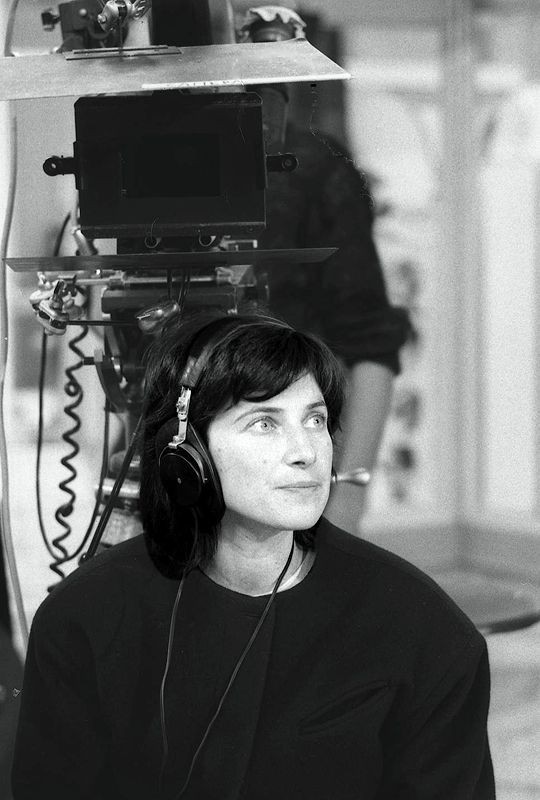
She was a lesbian, though she didn't talk about it much and didn't want to be reduced to a "lesbian filmmaker". She was married to Sonia Wieder-Atherton, a cellist. Female homosexuality is a recurring theme in her movies - with sometimes long and explicit sex scenes between women, not at all created for the male gaze.
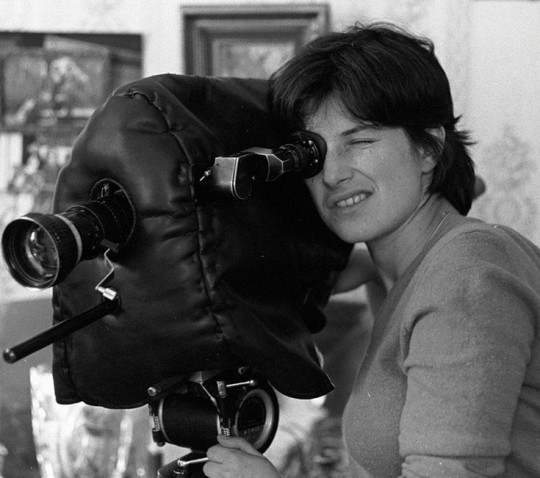
Chantal Akerman comes from a Polish Jewish family. Her grandparents and her mother, Natalia, were deported to Auschwitz, and only her mother returned. Her relationship with Judaism has had a profound influence on her cinema.
She studied briefly at the Institut National Supérieur des Arts du Spectacle in Paris, before going to New York, meeting some other filmmakers, and making some short movies, movies and documentaries. But her huge international success came in 1975, with Jeanne Dielman.
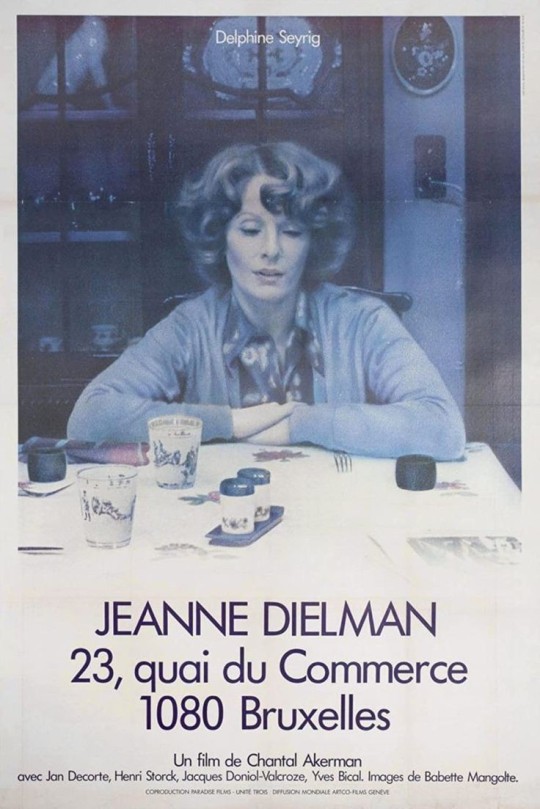
"I was tossing and turning in bed, worried. And suddenly, in a single minute, I saw the whole of Jeanne Dielman..."
I'm going to try and keep it professional when I talk about Jeanne Dielman, but it's going to be hard, because I LOVE this film.
It's a three-hour film that follows three days in the life of a widowed housewife, Jeanne Dielman, who lives with her son, spends her time doing household chores and prostitutes herself to survive. The film is shot in the illusion of real time: if Jeanne spends 30 minutes cleaning her living room, you'll be watching her do it for 30 minutes. (Obviously none of the scenes are that long and there are ellipses but that's to illustrate my point). It's revolutionary. A poignant film about the condition of housewives, alienation, the way we make sure we're busy all the time so we don't have to think about life or death. The tension escalates little by little until the deeply disturbing end of the film, when everything comes crashing down. A masterpiece. Everyone should watch it. It's long but it's worth it! (Plus the main actress is incredible, both as an actress and as a person).
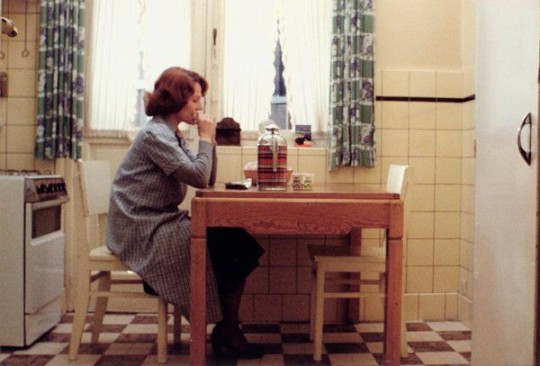
This film was a huge success, and she continued to make others, with recurring themes of the status of women, mother-daughter relationships, lesbianism, death, mental health, alienation, boredom, the need for freedom, solitude, the passage of time, inner suffocation...
More generally, women are at the heart of his work. Women, their inner lives, their identity as women, their experiences...
Chantal was also a great feminist. She defended women's rights in her words, her actions and her films, and was keen to put women in the spotlight. She even surrounded herself almost exclusively with women to create her films.
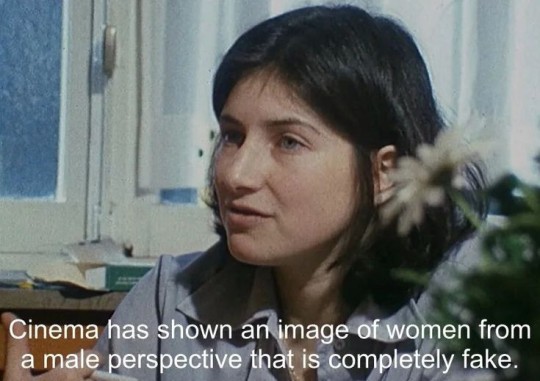
Suffering from manic-depressive psychological disorders and deeply affected by the death of her mother Natalia a year and a half earlier, she decided to end her life at the age of 65 on 5 October 2015 in Paris.
She is buried in Père-Lachaise cemetery.
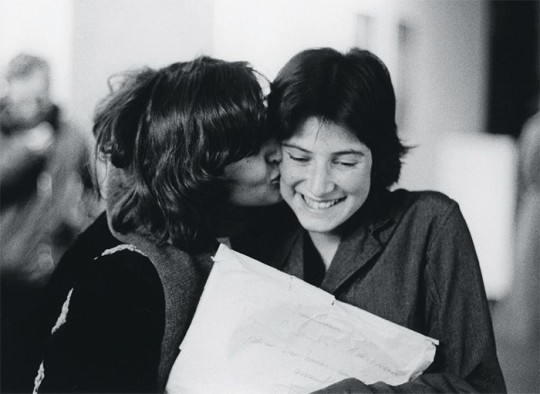
She is remembered today as an extraordinary filmmaker and a true innovator. Her films, long, emotionally chanllenging, psychologically and philosophically profound, are quite simply splendid. Check her work!!!
Chantal had a unique and magnificent style, and many more people should watch her films and documentaries.
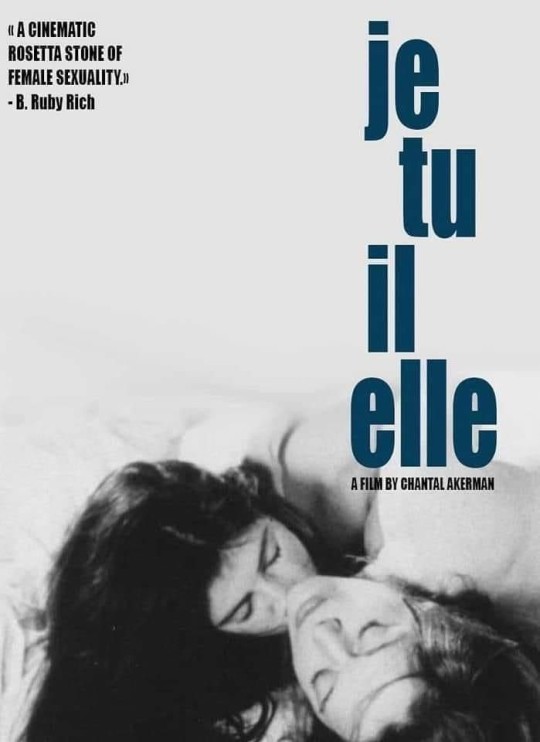
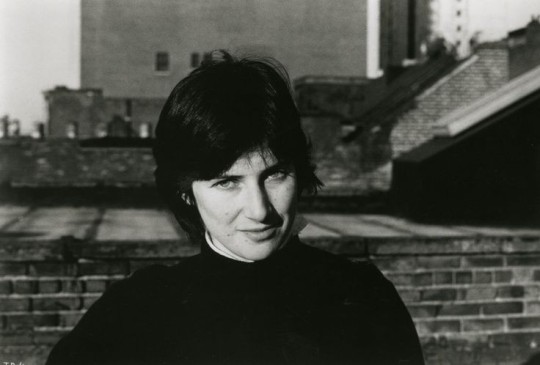
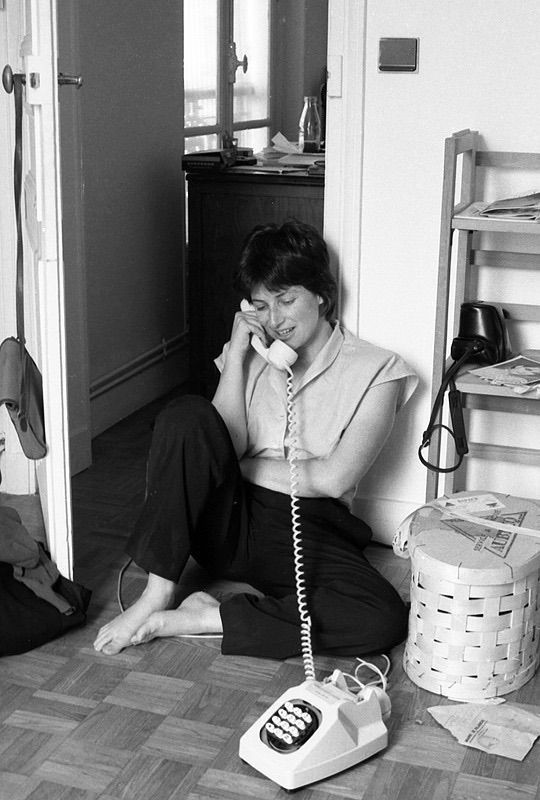
#chantal akerman#jeanne dielman#cinema#movies#filmaker#female filmmakers#female film directors#lesbian filmmaker#lesbian#lesbian pride#pride#pride month#lesbian history
207 notes
·
View notes
Text
by Shiryn Ghermezian
Israeli actress Noa Cohen defended the decision to cast her as Mary of Nazareth, the mother of Jesus, in a new Netflix movie and also admitted she was not surprised about the social media uproar regarding the casting.
“I expected it but you know what, I feel like DJ [Caruso, the director], our producer, and the rest of the team did the best they could to stay as authentic as possible and they just wanted to find the right person and the right cast for the job,” Cohen told the Associated Press on Tuesday. “And I am a Jewish woman, who’s playing a Jewish woman. I grew up in Israel, which is modern day Judea, which is where Mary grew up. So I feel very, very comfortable portraying her and I did that from a place of true sincerity in my heart.”
“People don’t have to like it, but I like this role very much and I’m very, very proud of it,” she concluded.
Netflix released the official trailer for “Mary” in November and began streaming the film on Dec. 6. The coming-of-age drama, which additionally stars two-time Academy Award winner Anthony Hopkins as King Herod, tells the story of the birth of Christ. Besides Cohen, “Mary” also stars four other Israeli actors — Ido Tako, who plays Cohen’s husband Joseph; Ori Pfeffer; Hilla Vidor; and Mili Avital. The film was shot in Morocco and American Pastor Joel Osteen served as an executive producer on the film. Netflix said filmmakers “consulted with a wide range of religious scholars and leaders to capture the story’s historical elements.”
After the trailer for “Mary” premiered, pro-Palestinian activists on social media quickly lambasted the filmmakers and called for a boycott of the film because an Israeli Jewish actress was cast to play the lead role. They falsely claimed that Mary and Joseph were Palestinian, and that Jesus was also Palestinian or “a Palestinian Jew.” The Palestinian media outlet Quds Media Network also related the film to the “ongoing genocide of Christians in Palestine.”
Cohen shared in an interview on Tuesday night that she received multiple death threats while filming the Netflix project in Morocco last year.
52 notes
·
View notes
Note
re: this post, would you perhaps be able to reword it? i understand the words you're using individually, and i think i might kind of get what you're trying to say, but it's just one very long sentence and so i'm having trouble parsing it! (wait--i just reread it. initial question canceled, mostly--now: what alternatives might we have available to us?) and what does this section: "it feels all too easy to jump from that to then just stymieing our ability to actually describe the textual violences necessary to the discursive construction of that normativity in the first place" mean, exactly? thank you as always for running this blog. :-)
What I’m describing is a critical phenomenon wherein people will approach (usually canonical) horror texts which reify hegemony by ‘identifying’ with the monster who is generally figured in terms of alterity in some capacity; by extricating, for example, a queer narrative out of what is in fact a homophobic one, and treating this as something of a ‘reclamatory’ practice in which one ‘relates’ to that which the text figures as monstrous. The most common instance of this which I see is people’s discussion of Carmilla as an erotic lesbian romance; other examples include Dracula, or Frankenstein, or the socially currency invested in the idea of a ‘madwoman in the attic’ (ie. Jane Eyre).
I don’t think this is like, a practice that we need to do away with entirely, lol – but I do think that a) there are marginalised writers + filmmakers who are making horror with actual teeth, with actual radical edge, and we don’t need to keep pretending like this approach of reclamation-through-identification with a monster in a v normative work is all we have available to us when politically subversive horror does very much exist, and b) this critical practice is often vvv limited in its discursive scope, and tends to lack the kind of materialist analysis that I would consider necessary in talking about literatures of alterity/marginality/violence.
When I talked about stymieing our ability to describe the textual violences necessary to the discursive constructions of that normativity in the first place, I meant that overfocusing on these texts as “reclaimed” articulations of an essentially queer (or otherwise ‘othered’) imaginary can inhibit our ability, as critics, to describe how those texts in fact do not think of their monstrous figures as worthy of a sympathetic or appreciative narrative. I mentioned Carmilla above – we can talk about Carmilla as erotically lesbian, sure, but how far down the line in talking about it as a Queer Narrative do we lose track of the fact that the text itself asserts the sexual norms of white Christian hegemony to necessarily succeed over the perversion of the corruptive, predatory lesbian, or as an Anglo-Irish work positing Carmilla as an Irish woman (and thus a contaminant threat to Anglo-Irish society)? At what point in adulating Dracula as articulating a particular form of queer, effeminate Jewishness destabilising and threatening Jonathan and Mina’s persistent heterosexuality do we lose track of Dracula as having grown out of the fear that the new waves of Jewish immigration in London’s East End were vampiric sources of contagion, or its possible relationship to the antisemitic smears that grew out of the Jack the Ripper murders? Or like, taking Bertha Mason (or ‘the madwoman in the attic,’ because truly, v few people using this phrase are actually thinking about Bertha Mason lol) as a kind of feminist paragon – at what point do we begin to overlook the fact that Jane Eyre is a v racist text?
These aren’t necessarily contradictory approaches – like, for example, you can talk about ‘identifying’ with Dracula as emblematic of British Jewish assimilation and the discontents thereof whilst also talking about Dracula as an antisemitic text, even if the analysis in the former isn’t especially coherent – but the focus of the ‘identification’ treatment is often incredibly limited in its scope, and those limitations can often be detrimental to one’s ability to talk frankly and honestly about what a text actually says and does. A very good example such limitations is that of Frankenstein; an identification with Frankenstein’s monster as an entrypoint for textual analysis obfuscates the way in which Frankenstein constructed a discursive template by which the ameliorationist argument against the immediate abolition of slavery could be argued for. (The linked post lays this out v clearly, but the cited source is Mary Mulvey’ Roberts’ ‘Mary Shelley, Frankenstein, and Slavery,’ in Dangerous Bodies: Historicising the Gothic Corporeal). What I basically mean is, when we talk about relating to, identifying with, ‘reclaiming’ the monster, we have to have a real grasp on what it is we’re trying to impose such a practice on, and what the actual substance of the source text has to say for itself. I’m not one for assuming a text as a body with a set of metaphysical properties that we as critics are tasked to find – I think the relationship between text and reader ought to be dialectical – but part of that dialectical process means situating the text in its material social context and responding appropriately.
494 notes
·
View notes